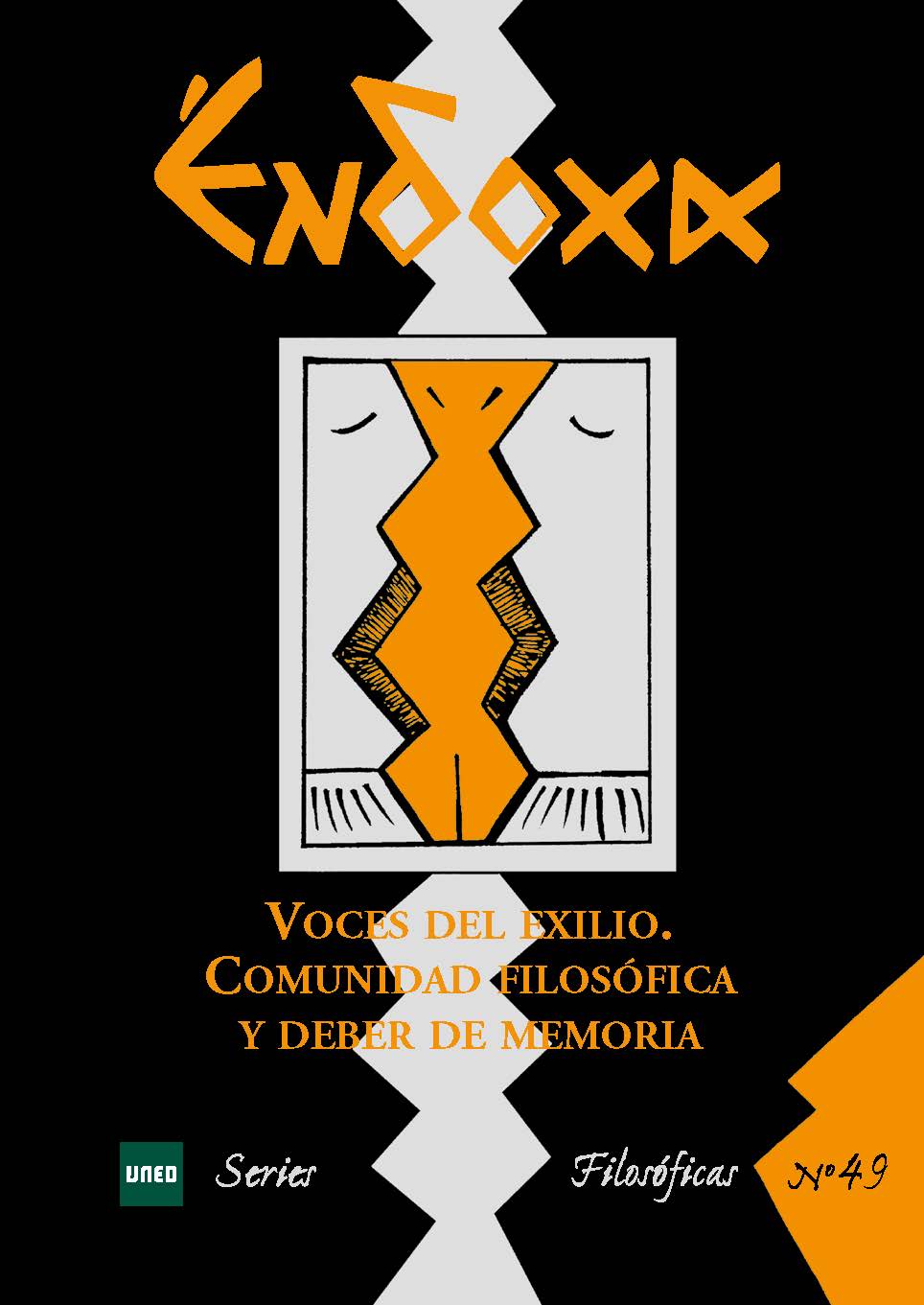La construcción de los mitos del fascismo
A propósito de un texto de Max Aub
DOI:
https://doi.org/10.5944/endoxa.49.2022.26130Palabras clave:
Max Aub, fascismo, mito, biopolítica, literatura antifascista, crítica cultural.Resumen
Max Aub es uno de los escritores en lengua castellana que mejor analizó los movimientos fascistas europeos a lo largo de su obra. Particularmente significativo es su temprano trabajo Sobre algunos mitos fascistas publicado en Nueva Cultura (1936). Siguiendo este texto, este artículo busca exponer el trabajo de Aub como intelectual comprometido con la lucha antifascista desde la crítica cultural, así como las ideas que sobre el fascismo y el totalitarismo posee al comienzo de la Guerra Civil española. Aub centra sus reflexiones en la reconstrucción del mito por parte del fascismo, donde el racismo la biopolítica y las masas son claves para entender a los movimientos totalitarios europeos. Un análisis que el escritor desarrollará en su fecunda narrativa, construyendo uno de los corpus literarios que, de manera más compleja, intentarán comprender al totalitarismo en lengua castellana y que suma a Max Aub a la gran tradición de pensamiento europeo antifascista.
Palabras clave: Max Aub, fascismo, mito, biopolítica, literatura antifascista, crítica cultural.
Descargas
Citas
AGAMBEN, Giorgio (2002). Lo que queda de Auschwitz: El Archivo y el testigo, Valencia: Pretextos.
ARENDT, Hannah (2006). Los orígenes del totalitarismo, Madrid: Alianza Editorial.
AUB, Max (2003). Nuevos diarios inéditos 1939-1972. (ed. Manuel Aznar Soler), Sevilla: Renacimiento.
— (2002). Hablo como hombre, Segorbe : Fundación Max Aub.
— (1998). Diarios (1939-1972). (ed. Manuel Aznar Solor) Barcelona: Alba Editorial.
— (1936). “Sobre algunos mitos fascistas“. Nueva Cultura, nº 10, pp. 13-14.
AZNAR SOLER, Manuel (2010). República literaria y revolución (1920-1939), Sevilla: Renacimiento.
— (1985). "Nueva Cultura. Revista de crítica cultural (1935-1937)”, Debats, Nº.11, pp. 6-20.
BENJAMIN, Walter (1987). “La obra de arte en la época de su reproductibilidad técnica.” Discursos interrumpidos I, Madrid: Taurus, pp. 15-60.
CALLES, Juan María (2006). “Sobre algunos mitos fascistas Un texto olvidado de Max Aub”, El Correo de Euclides: anuario científico de la Fundación Max Aub, Nº. 1, Segorbe: Fundación Max Aub, pp. 469-485.
ESPOSITO, Roberto (1996). “Mito”. Confines de lo político. Nueve pensamientos sobre política, Madrid: Trotta, pp.95-113.
FORTI, Simona (2016). “Totalitarismo, filosofía y biopolítica“. Estudios Públicos,142, pp.129-150.
— (2008). El totalitarismo: trayectoria de una idea límite. Barcelona: Herder.
LACOUE-LABARTHE, Philippe; NANCY, Jean – Luc, (2002). El Mito Nazi, Barcelona: Anthropos.
MORALES MARTIN, Juan Jesús (2017) “Guerra y totalitarismo en un seminario de El Colegio de México (1943). Aproximaciones al pensamiento de José Medina Echavarría” Bajo Palabra. Revista de Filosofía, Nº 13, Madrid: UAM pp. 89 – 105.
— (2013) “Cartas del exilio. Correspondencia Max Aub – José Medina Echavarría (1941-1965)”, El Correo de Euclídes, Nº 8, Segorbe: Fundación Max Aub, pp. 60-81.
SÁNCHEZ CUERVO, Antolín (2017). “Dos interpretaciones del fascismo. Ortega y Gasset y María Zambrano” Bajo palabra. Revista de filosofía, Nº.13, Madrid: UAM, pp. 61-75.
Publicado
Versiones
- 27-06-2022 (2)
- 27-06-2022 (1)
Cómo citar
Número
Sección
Licencia
Derechos de autor 2022 ENDOXA

Esta obra está bajo una licencia internacional Creative Commons Atribución-NoComercial-SinDerivadas 4.0.
Los autores que publican en esta revista están de acuerdo con los siguientes términos:
1. Los autores ceden de forma no exclusiva los derechos de explotación de los trabajos aceptados para su publicación a Éndoxa, garantizan a la revista el derecho de ser la primera publicación del trabajo y permiten que la revista distribuya los trabajos publicados bajo la licencia de uso indicada en el punto 2.
2. Las obras se publican en la edición electrónica de la revista bajo una licencia Creative Commons Reconocimiento-SinObraDerivada 4.0 . Se pueden copiar, usar, difundir, transmitir y exponer públicamente, siempre que: i) se cite la autoría y la fuente original de su publicación (revista, editorial y URL de la obra); ii) se mencione la existencia y especificaciones de esta licencia de uso.
3. Condiciones de auto-archivo. Se permite y se anima a los autores a difundir electrónicamente la versión post-print (versión evaluada y aceptada para su publicación) de sus obras antes de su publicación, siempre con referencia a su publicación en Éndoxa, ya que favorece su circulación y difusión más temprana y con ello un posible aumento en su citación y alcance entre la comunidad académica. Color RoMEO: verde.







